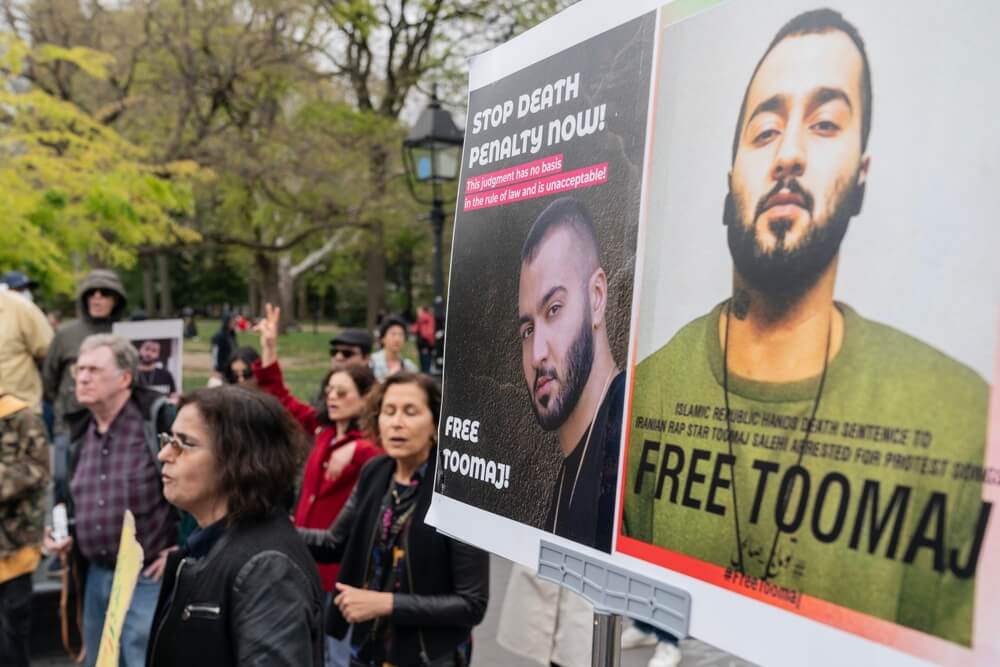In Iran, Toomaj Salehi has become a potent symbol of resistance. A rapper known for his lyrics advocating social justice and challenging both mullahs and monarchs, Salehi now faces execution under charges of “corruption on Earth”—a deliberately vague accusation employed by the regime to instill fear and suppress opposition.
The charge serves as a theatrical tactic designed to divert attention from the regime’s failures and to silence a prominent dissenting voice.
Salehi’s ordeal starkly reminds us of the lengths to which autocratic regimes will go to clamp down on dissent. His “crime” has been to use his artistic talent to express the frustrations and aspirations of the Iranian people, directly challenging the systemic injustices that pervade their society. The ambiguous charges against him epitomize the Iranian regime’s strategy of using broad legal language to persecute anyone bold enough to question its authority.
History shows that autocratic leaders often employ high-profile executions to intimidate citizens and suppress potential uprisings by projecting an image of indomitable strength. The execution of Navid Afkari, a young Iranian wrestler, in 2020 is a poignant example. Afkari’s last words, “I realized they are looking for a neck for their noose,” underscored the regime’s readiness to employ capital punishment to quell dissent and prevent uprisings. His execution, which drew international condemnation, serves as a stark illustration of how Iran’s supreme leader uses such tactics to silence opposition.
President signs law aimed at holding Iran accountable
The timing of Salehi’s death sentence is especially concerning, coinciding with intensified scrutiny and international pressure on Tehran’s regime. On April 24th, President Biden signed into law the 21st Century Peace through Strength Act, aiming to hold the Iranian regime accountable for its human rights abuses. On the same day, Salehi’s lawyer was informed about the impending execution, which contradicts an Iranian Supreme Court ruling that Salehi’s case qualified for amnesty. Tehran’s regime opted to use a tactic to divert both national and international attention from these pressures and to reenergize its oppressive forces against dissent.
In recent weeks, there has been a shocking spike in executions in Iran, with 19 recorded in just one week and a total of 39 in the past two weeks. Despite the Iranian regime’s relentless crackdown through killings and executions, the movement for change has not only persisted but has also grown in intensity and scale.
This ongoing resistance highlights that the regime’s brutal tactics have failed to deter the Iranian people from their determined quest for freedom. However, the regime continues to signal to Washington that legislative actions like the passage of the 21st Century Peace through Strength Act are ineffectual if not accompanied by tangible enforcement. A glaring instance of this is the Biden administration’s inadequate enforcement of existing sanctions against Tehran’s regime, as evidenced by continued economic activities of sanctioned entities.
Now, pivotal questions arise. Will the newly enacted law motivate the Biden administration to act decisively in favor of Iranian people, or will it continue the appeasement towards Tehran? Moreover, will the administration take significant steps to prevent the execution of Toomaj Salehi and other political prisoners facing imminent death?
A test of White House resolve
This situation tests the administration’s resolve and readiness to shift its Iran policy. It is a test of standing in solidarity with the Iranian people, whose vociferous demand for regime change—a call for a non-nuclear, secular republic—resonates beyond their borders.
With the 21st Century Peace through Strength Act in place, the White House has more tools at its disposal for comprehensive sanctions against Ali Khamenei, the supreme leader, Ebrahim Raisi, the president, and their affiliated offices for human rights violations and support for terrorism.
The law also sanctions many institutions under Khamenei’s control, including the Ministry of Intelligence, the Islamic Revolutionary Guard Corps (IRGC), the police force, the paramilitary forces of Basij and the Judiciary, citing Raisi’s involvement in the 1988 Death Commission, which led to the execution of thousands of political prisoners. Therefore, it is not a question of capability but rather of political will to hold Tehran’s regime accountable.
This critical moment calls for more than just condemnation; it demands a robust and concrete affirmation of support for the fundamental human rights of the Iranian people. What is needed is a comprehensive U.S. policy toward Iran that integrates human rights advocacy through actions, strategic deterrence and international pressure that presents a formidable framework as suggested through the bipartisan House resolution 1148. That measure calls for “the rights of the Iranian people, the protesters, and the Resistance Units to confront the Islamic Revolutionary Guard Corps (IRGC) and repressive forces to bring about change.”
By prioritizing accountability, recognizing the Iranian people’s rights to change the regime in Tehran and fostering international collaboration against the IRGC, the supreme leader and his president, the United States can lead the way to peace and stability in the Middle East.







